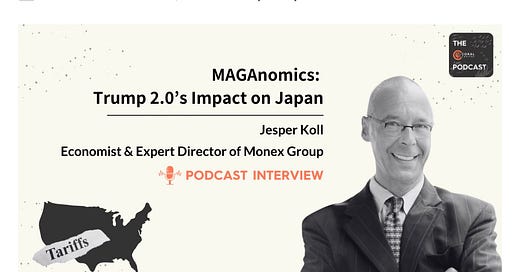MAGAnomics - the impact on Japan
My podcast conversation with Coral Capital on the Japan outlook now that the forces of "America-first-&-foremost" are beginning to hit
I had the pleasure of being invited to a podcast with James Riney and Tiffany Kayo from the Japan-specialized venture capital fund Coral Capital. The focus of our discussion is on the Japan outlook - why the forces unleashed by MAGAnomics are poised to derail the Japan up-cycle; and why, at the same time, the case for Japan Optimism remains strong. Yes, Japan is “Capitalism that works” - if at all, the external shock created by America’s new self-centeredness will serve as added catalyst for accelerated positive change domestically. The corporate and socio-political metabolism is poised to accelerate further, creating even more Japan opportunities.
Executive Summary by the team of Coral Capital:
Jesper warns that a Trump 2.0 presidency could trigger a double whammy for Japan: a weaker dollar slashing Japanese corporate profits and an aggressive U.S. tariff regime pushing China to dump exports into Southeast Asia—hurting Japan’s industrial giants in the process. But he’s still bullish on Japan.
Why? Jesper sees Japan as “capitalism that works”—a system quietly modernizing under the radar. From record M&A and MBO activity to a younger generation of CEOs open to change, Japan is entering a new phase of productivity and openness. He highlights the ongoing shift to performance-based pay, increased immigration, and growing startup dynamism as key signs of this transformation. We talk about:
Why a weaker dollar is Japan’s silent earnings risk: With two-thirds of Japanese listed company profits coming from overseas, a 10-yen appreciation can slash earnings by 8%. If Trump 2.0 weakens the dollar, Japan takes a hit—fast.
Japan isn’t insular—it’s hyper-globalized: Despite its reputation, Japan generates a higher percentage of corporate profits overseas than the U.S. or Germany. From Daichi Life to Toyota, Japan’s biggest firms are already global players.
The real threat of Trump’s China policy is deflation via the Global South: U.S. tariffs could force China to dump excess goods into Southeast Asia, undercutting Japanese firms not just on price, but now on quality too.
Made in Japan = 30~40% price premium: Companies like Shiseido are relocating production to Japan not for politics, but for branding. “Brand-shoring” is about value, not alliances.
Why energy—not labor—is Japan’s factory hurdle: Labor can be automated. The real constraint on manufacturing in Japan may be uncertainty around energy costs and nuclear policy.
Japan’s brain gain is real—and measurable: While the population shrinks, immigration is quietly surging. Every day, 1,200 people get 3-year work permits. Companies are adapting with performance-based pay, not seniority resulting in higher talent liquidity.
Record M&A and MBOs aren’t a coincidence: As Japan’s CEOs get younger and legacy-heavy firms face succession issues, a wave of corporate transformation is underway. “Metabolism,” Jesper says, is up.
What Japan needs most is inheritance tax reform: MacArthur’s anti-zaibatsu policies made sense post-WWII. But now, without reform, Japan risks losing its $4.5T+ generational wealth transfer to debt paydown instead of innovation.
Japan’s “capitalism that works”: A system that’s democratic, fair, globally integrated, and quietly undergoing a transformation from within.
as always, comments welcome — enjoy & more soon ;-j






Here’s an naive question, IF Trump team USA goal is to have trade relations realigned towards US, expecting other countries to choose between US and Them (China), and Japan’s economy is 67% exports split equally between US, China & SE Asia, and much less to Europe, how will Japan’s creditor/banking arrangements with China & Hong Kong, and other interconnected relationships with China shake out in the Art of The Deal ?
Good to read, "the case for Japan Optimism remains strong"